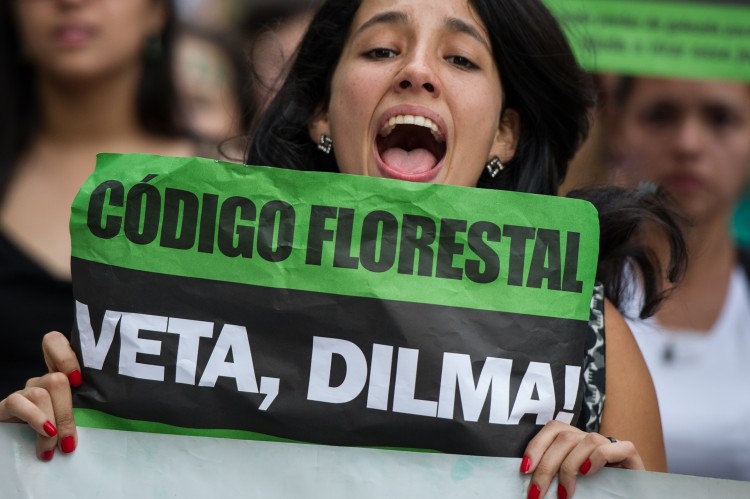Just weeks ahead of hosting a world forum on sustainable development, Brazilian President Dilma Rousseff partially vetoed a controversial forest bill that would loosen environmental responsibility in the Amazon. The bill will now be returned to legislators in a move that local and global environmental groups are greeting with a cold to lukewarm response.
“For the last decade, Brazil has been on a path of economic and environmental progress. President Rousseff’s statement ... creates an uncertain future for Brazilian forests, considering the Congress could still cut forest protections even further,” said Jim Leape, WWF International director general in a statement.
This “Código Florestal,” or Forest Code, was passed in December 2011 by the agribusiness-dominated Senate. To go into force, the law needs the president’s consent. Now that Rousseff has vetoed 12 of the bill’s 84 articles, passage is on hold until those 12 points are amended and returned to the president.
Nothing will move ahead now until after Brazil hosts the United Nations Conference on Sustainable Development, Rio+20, at the end of June.
“President Rousseff’s unfortunate decision will make it difficult for her to speak credibly about sustainable development when heads of state gather in Rio next month,” reads the WWF statement.
What’s In, What’s Out
Some of the bill’s most contentious provisions were vetoed or revised, but others were kept.
The president struck down the proposed amnesty for landowners who illegally cleared forest before July 2008. Offending landowners will also have to restore what they destroyed—although this can be done through planting some exotic species and cash crops, which conservationists reject.
She amended the article that allowed farmers and ranchers to cut forest on the sensitive land close to riverbanks and on hilltops. This is considered very risky by environmentalists because it can destroy river habitats, increase the chance of erosion, and lead to deforestation. Loggers usually prefer cutting close to rivers since it offers an easy way to transport the felled trees.
Rousseff increased the size of the buffer of forest that must be left along riverbanks from 10 meters (33 feet) to up to 100 meters (328 feet). However, she kept the controversial provision that decreases the amount of land farmers must preserve as forest.
Another controversial aspect she changed was allowing large landowners and farmers to ignore illegal deforestation activities on their lands. The bill stated that landowners would not be liable to restore forest cleared as a result of illegal activity.
Rousseff and her environment minister are strongly against this aspect of the law.
“The big [farmers] have vast extensions of land and have the means to recover all the areas of permanent preservation,” said Brazil’s Environmental Minister Izabella Teixeira, a strong opponent of the code.
In contrast, Brazil’s Agriculture Minister Jorge Ribeiro Mendes, has been in favor of the bill’s farmer friendly provisions. “It’s the code of those who believe it’s possible to produce food and preserve the environment,” he has said.
Brazil is considered the lungs of Earth, absorbing CO2 and producing oxygen for the whole planet. The Amazon rainforest, due to its density and large amount of wide-leaf plants is also considered by some scientists to be very important factor in slowing down global warming.
In Brazil, around 20 percent of Amazon rainforest has been destroyed. To battle illegal deforestation, in 2008, the government set up environmental police that use satellite images to scan the vast Amazon area and stop any illegal activities. Since then, deforestation has slowed down, reaching its slowest pace from August 2010 through July 2011, when only 2,410 square miles (about five times the size of New York City) of rainforest was illegally cleared.
Currently, there are 1,400 environmental police in Brazil responsible for covering massive tracks of the Amazon approximately equal to the size of United States west of the Mississippi River.
The Epoch Times publishes in 35 countries and in 19 languages. Subscribe to our e-newsletter.







